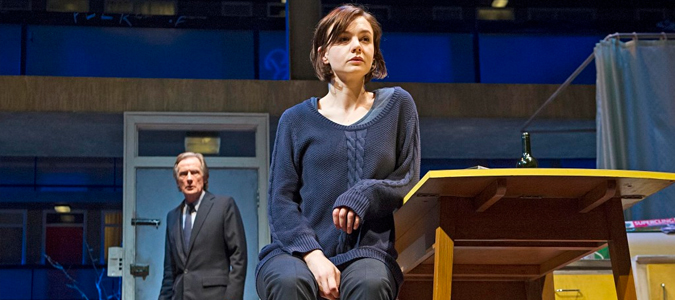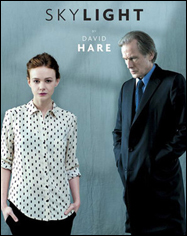

Skylight
Opening Night: April 2, 2015
Closing: June 21, 2015
Theater: John Golden Theatre
On a bitterly cold London evening, schoolteacher Kyra Hollis (Carey Mulligan) receives an unexpected visit from her former lover, Tom Sergeant (Bill Nighy), a successful and charismatic restaurateur whose wife has recently died. As the evening progresses, the two attempt to rekindle their once passionate relationship only to find themselves locked in a dangerous battle of opposing ideologies and mutual desires.
BUY TICKETSREAD THE REVIEWS:
April 2, 2015
They are hardly a well-matched pair, this couple that has been given such transfixing life in two of the most expert stage performances you’re likely to see for many seasons. As embodied by Carey Mulligan and Bill Nighy in the heart-piercing revival of David Hare’s “Skylight,” Kyra Hollis and Tom Sergeant have none of the things in common that usually make for a fine romance. In age, attitude and even metabolism, they’re separated by a forbidding gulf. And don’t get them started on politics, or economics, or even cooking. Yet as you watch Ms. Mulligan and Mr. Nighy move magnetically toward and away from each other in Stephen Daldry’s exquisitely balanced London-born production, which opened on Thursday night at the Golden Theater, you can’t help thinking that on some profound level these two were made to be together. And therein lies the tragedy. Tear-stained stories of impossible love have been a staple of theater for centuries. And Mr. Hare’s 1995 drama, his tightest and quite possibly his best, delivers big on the rueful pleasures of that genre.
READ THE REVIEWApril 2, 2015
The fierce pas de deux of love and loss and anguish executed by Carey Mulligan and Bill Nighy in “Skylight” leaves you breathless — and wondering how they can sustain this level of emotional intensity throughout the show’s 13-week Broadway run. David Hare’s 1995 drama, which floored West End audiences when director Stephen Daldry staged it last year with the same great cast, registers as a character-flaying study of ex-lovers whose lives and sensibilities have diverged since they parted. But deep down, it’s a scathing censure of the Thatcher government’s political legacy of social inequality and economic injustice. If there were a Tony Award category for Most Depressing Stage Setting, Bob Crowley would win in a walk for his dismal visual of a 1990s council estate (we call them “projects”) in a desperately poor London neighborhood in the dead of winter. In the background, Natasha Katz’s skillfully choreographed lighting of tower-block apartment windows and the piercing sounds of crying babies and barking dogs provided by Paul Arditti complete this dreary portrait of human pond life at the bottom of the social pool.
READ THE REVIEWApril 2, 2015
A young woman and an older man whose affair ended in a white-hot flash attempt to reconnect in David Hare’s “Skylight,” an artfully performed drama set in the 1990s in Great Britain. It’s just opened at the Golden Theatre, with its cast intact from a West End run last year. Carey Mulligan, the Oscar-nominated actress of “An Education” — I loved her as Daisy Buchanan in Baz Luhrmann’s “The Great Gatsby,” and she’s just great here — stars as Kyra Hollis, a well-educated upper-middle-class woman of perhaps 30 who’s now teaching disadvantaged students in East London. On a snowy night, Kyra is visited by her former lover, a wealthy restaurateur whose wife has recently died (Bill Nighy, of “Love Actually” and “The Best Exotic Marigold Hotel” films). All the action in Hare’s 1995 drama transpires in Kyra’s rundown first-floor London flat, which Nighy’s Tom Sargeant finds distasteful.
READ THE REVIEWApril 2, 2015
The last time Bill Nighy displayed his rangy yet precision-tooled physicality, his world-weary vocal and facial expressivity and his needling intellect on Broadway was in 2006 in “The Vertical Hour.” In that otherwise disappointing follow-up to “Stuff Happens,” playwright David Hare continued his reflection on the personal and political consequences of war, albeit with less incisiveness. It’s a pleasure to have the British actor back, and in top form, in the far superior 1995 Hare play “Skylight,” which also to some degree is about individual versus collective responsibility. Directed with probing clarity by Stephen Daldry, the beautifully acted revival pits Nighy against an equally compelling Carey Mulligan. The excellence of the production — which transfers intact from London and also includes Matthew Beard (“The Imitation Game”) in the small but essential role of the anxious 18-year-old son of Nighy’s well-heeled restaurateur — goes a long way toward finding balance in the play. While it has a terrific first act, “Skylight” ultimately works better as a complex relationship postmortem than as an issues debate about class, privilege and social conscience in a country of chasmic income inequality. But even when Hare stops inferring his point and starts using his characters as mouthpieces, this is riveting stuff, its commentary on the wealth divide as relevant now as it was then.
READ THE REVIEWApril 2, 2015
Society looms large in the Stephen Daldry’s charged revival of David Hare’s “Skylight” — and not just in the second-act state-of-the-nation wrangle between low-income schoolteacher Kyra (Mulligan) and shamelessly rich restaurateur Tom (Nighy). Bob Crowley’s set, backed by a colorful but defiantly drab bank of tenement windows (“council flats” to the British), never lets you forget the wider world beyond Kyra’s drab, barely heated flat. No matter how bitterly personal—or airily abstract—things get between these ex-lovers, you cannot ignore the unseen lives going on behind so many strangers’ panes. The bulk of Hare’s long theatrical output has doggedly tracked his political and cultural times, a commitment to the now that potentially slaps an expiration date on a work of art. “Skylight,” while it doesn’t burst with topical references, is very much a post-Thatcher, pre-Blair play, with capitalist bullyboys such as Tom maintaining business as usual and disenchanted insiders such as Kyra dedicating themselves to repairing the damage of the ’80s.
READ THE REVIEW





















